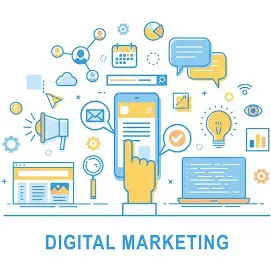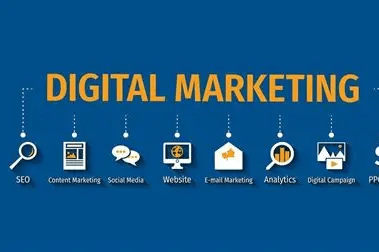Why Digital Marketing is Important: A Comprehensive Guide
In today’s fast-paced, hyper-connected world, digital marketing is no longer a luxury—it’s a necessity. Whether you’re a startup, a small local business, or a global enterprise, your ability to reach, engage, and convert customers hinges on how effectively you can leverage digital platforms. But why exactly is digital marketing so important?

In this blog, we’ll dive deep into the reasons digital marketing is not just relevant, but critical to business success in the 21st century. From its cost-effectiveness to its unmatched reach, from measurable results to targeted campaigns—digital marketing offers benefits that traditional marketing can’t match.
1. Digital Marketing Offers Unmatched Reach
One of the most obvious and powerful advantages of digital marketing is its global reach. With the click of a button, your content, products, or services can be viewed by someone halfway across the world.
- Geographical boundaries no longer matter. Whether you’re running a small business in Mumbai or a fashion store in Paris, digital marketing can help you attract and serve customers across continents.
- Multiple platforms, multiple audiences. Whether it’s Google, Facebook, Instagram, YouTube, or TikTok, each platform gives access to specific user bases with distinct interests and behaviors.
In contrast, traditional marketing methods—TV ads, print media, billboards—are restricted by geography, budgets, and production limitations.
2. It’s More Cost-Effective Than Traditional Marketing
For startups and small businesses, budget constraints are real. Running TV ads or printing thousands of flyers isn’t just expensive—it’s often inefficient.
Digital marketing provides:
- Low-cost entry points: With as little as $5, a business can start a social media ad campaign.
- Better ROI: You can target only those people who are likely to buy, minimizing waste.
- Flexible budgets: Campaigns can be scaled up or down based on performance and budget availability.
For example, email marketing delivers an average ROI of $42 for every $1 spent, according to the Data & Marketing Association.
3. Highly Targeted Campaigns
Digital marketing allows unprecedented control over who sees your content:
- Demographics: Age, gender, income, education
- Geographics: City, state, country
- Psychographics: Interests, lifestyles, values
- Behavioral: Purchase behavior, website interactions, time on site
Platforms like Facebook Ads and Google Ads use powerful algorithms to ensure your message reaches the right people at the right time, increasing conversion potential exponentially.
Traditional marketing can’t match this level of precision. You can’t be sure who’s looking at a billboard or reading a newspaper ad.
4. Measurable and Trackable Results
One of the most transformative aspects of digital marketing is the ability to track and measure every action:
- Clicks
- Impressions
- Conversion rates
- Customer acquisition costs
- Lifetime customer value
Tools like Google Analytics, Facebook Business Manager, and email marketing dashboards give you real-time data that can inform decision-making and campaign adjustments.
With traditional marketing, measurement is difficult and often inaccurate. How do you know how many people acted on your radio ad? In digital, the data speaks.
5. Improves Customer Engagement
Digital marketing is not a one-way street. It allows for two-way communication between businesses and their customers:
- Comments and replies on social media posts
- Live chats on websites
- Interactive polls, quizzes, and contests
- User-generated content campaigns
- Email feedback and surveys
This ongoing engagement builds trust, fosters brand loyalty, and increases customer retention.
Contrast this with traditional marketing methods like TV or print, where there’s minimal to no customer interaction.
6. It Supports All Stages of the Customer Journey
The customer journey today is not linear. People may discover your brand through Instagram, research it on Google, read reviews, sign up for a newsletter, and only then make a purchase.
Digital marketing supports this multi-touchpoint journey:
- Awareness: SEO, social media, paid ads
- Consideration: Email campaigns, case studies, explainer videos
- Conversion: Remarketing ads, landing pages, checkout optimization
- Loyalty: Loyalty programs, retargeting, personalized email content
- Advocacy: Review requests, referral programs, shareable content
Each stage is powered by specific strategies tailored to the buyer’s mindset.
7. Real-Time Adaptability and Optimization
Unlike static traditional campaigns, digital marketing allows you to adapt in real time.
- Low-performing ads can be paused
- Budgets can be shifted
- Content can be updated instantly
- Audience targeting can be refined
- A/B testing can determine which strategy works best
This agility helps marketers maximize ROI and avoid wasted spending—something that’s almost impossible with print or TV campaigns.
8. It Builds Brand Reputation and Authority
Content marketing—blog posts, videos, infographics, podcasts—is a core part of digital marketing. When done well, it positions your brand as a thought leader and industry expert.
- Educate your audience through how-to guides, case studies, and webinars.
- Earn backlinks and improve SEO rankings.
- Encourage shares and word-of-mouth promotion.
Consistent, high-quality content builds brand trust and customer credibility, two key factors in conversion.
9. It Leverages Mobile and Voice Search
Over 60% of internet traffic today comes from mobile devices. Digital marketing strategies are inherently mobile-friendly—from responsive web design to mobile-optimized ads.
Additionally, with the rise of voice search (think Alexa, Siri, and Google Assistant), businesses are using conversational SEO and long-tail keywords to stay ahead of the curve.
Traditional marketing has no footprint in this space, missing out on a huge and growing segment of the population.
10. It Helps You Compete with Bigger Brands
Small businesses often feel dwarfed by large corporations with massive advertising budgets. But in the digital world, creativity, consistency, and customer focus can level the playing field.
- Local SEO allows small businesses to appear in “near me” searches.
- Social media content can go viral regardless of company size.
- Influencer marketing gives you access to engaged communities.
- Community management builds loyal fan bases.
A clever Instagram campaign can outperform a million-dollar TV ad if it resonates with the right audience.
11. It Provides Personalized Marketing Opportunities
Consumers now expect personalization. They want to feel like a brand “gets” them. Digital marketing enables:
- Personalized emails with product recommendations
- Dynamic website content based on user behavior
- Custom audiences on Facebook or Google Ads
- Retargeting ads that follow users after they visit your site
According to Epsilon, 80% of consumers are more likely to purchase when brands offer personalized experiences.
12. It Aligns with Modern Buying Behavior
The buyer’s journey has changed. Today’s consumers:
- Research online before buying
- Read product reviews
- Watch unboxing or explainer videos
- Compare multiple options
- Seek out discount codes and peer opinions
Digital marketing aligns perfectly with this behavior, offering information, social proof, and incentives right where the buyer is looking.
13. Scalability and Automation
Digital marketing platforms like email tools, social media schedulers, and CRM systems allow businesses to:
- Automate repetitive tasks
- Scale outreach without increasing costs linearly
- Segment users for more effective targeting
- Build automated sales funnels
This scalability is key for long-term growth and resource efficiency.
14. Supports Data-Driven Decision Making
Digital marketing gives you access to data analytics tools that let you track every campaign’s performance and make decisions backed by hard evidence.
- Identify which strategies drive the most revenue
- Understand customer behavior and preferences
- Allocate budget more efficiently
- Improve customer acquisition and retention
You’re not flying blind. Every decision can be data-informed.
15. It Future-Proofs Your Business
We are living in a digital-first economy. Consumer expectations are shaped by online experiences. Businesses that don’t adapt will be left behind.
Whether it’s:
- The shift to e-commerce,
- The rise of AI and chatbots,
- The power of influencer partnerships,
- Or the dominance of short-form video content,
Digital marketing is the bridge between your business and the future.
Final Thoughts
Digital marketing is not just important—it’s indispensable.
It allows businesses of all sizes to connect with their audiences, grow their brand, increase sales, and stay relevant in an increasingly digital world. The best part? It’s measurable, scalable, and constantly evolving.
If you’re not investing in digital marketing, you’re not just missing out on opportunities—you’re handing them to your competitors.
So whether you’re just getting started or looking to scale, now is the time to double down on your digital strategy.
